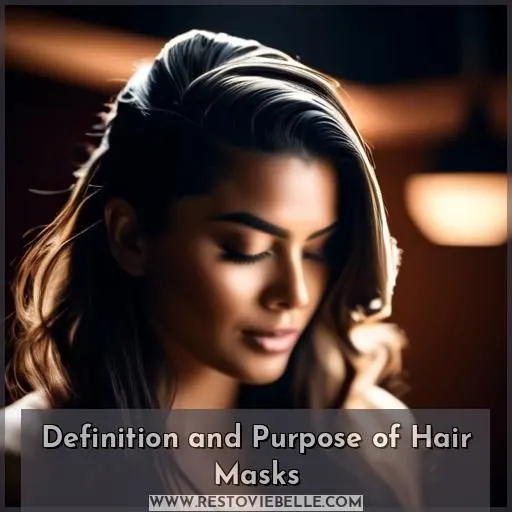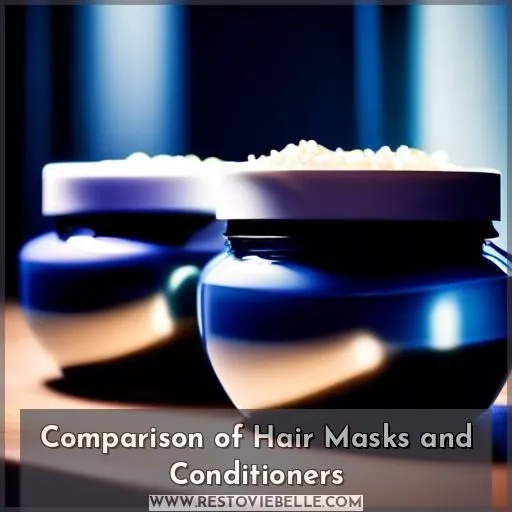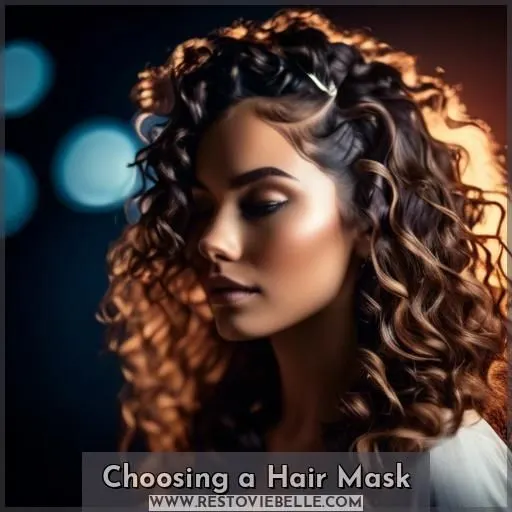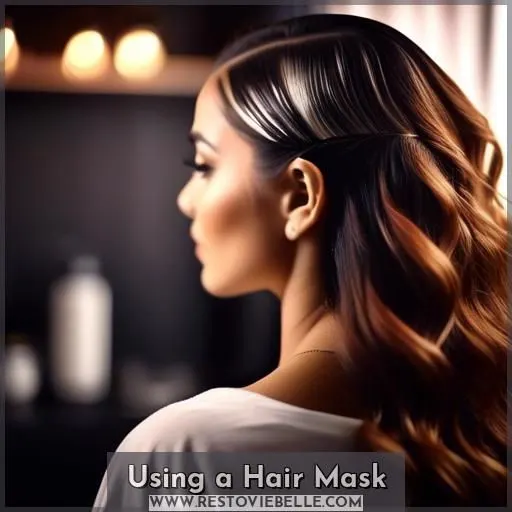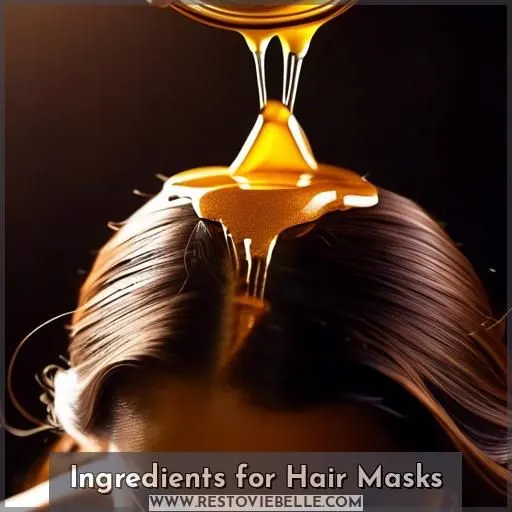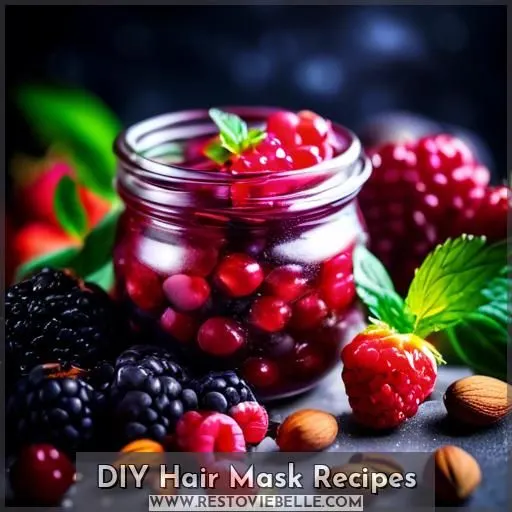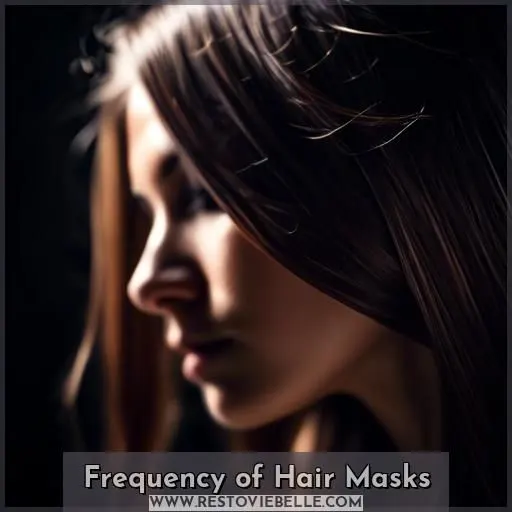This site is supported by our readers. We may earn a commission, at no cost to you, if you purchase through links.
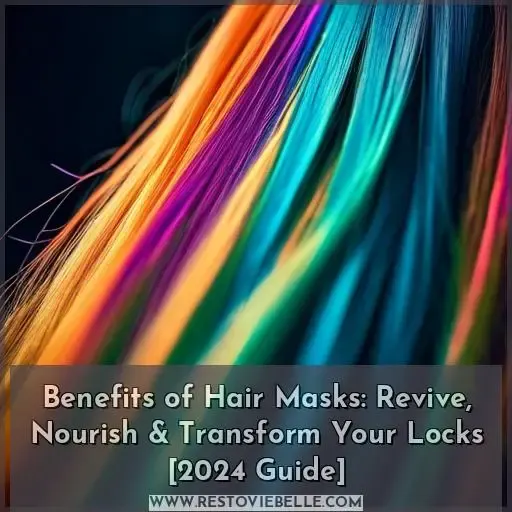
Hair masks offer unparalleled benefits for reviving and transforming your tresses. They deeply condition, increasing manageability and combating frizz for softer, smoother locks.
The concentrated ingredients nourish and strengthen, promoting healthy hair growth while restoring shine and vibrancy. Whether targeting dryness, damage from heat-styling, or keeping color-treated hair vibrant, hair masks tailor their benefits to your hair’s unique needs.
Indulge in this luxurious treatment, and you’ll soon discover the path to your most luscious, show-stopping strands yet.
Table Of Contents
Key Takeaways
- Hair masks provide deep conditioning, nourishment, and targeted repair for specific hair concerns.
- They can be used once a week for dry, frizzy, or damaged hair, and less frequently for oily hair.
- Hair masks are particularly beneficial for those with dry, frizzy, or damaged hair, as they can help restore and strengthen hair.
- Ingredients in hair masks can include natural items like bananas, eggs, avocado oil, honey, and coconut oil, which offer benefits such as hydration, nourishment, and protection from environmental factors.
Definition and Purpose of Hair Masks
Hair masks are a type of hair conditioner that provides more concentrated ingredients, deeper conditioning, and targeted repair for specific hair concerns. They’re typically left in the hair for a longer period, ranging from 20 minutes to several hours, compared to regular conditioners. Hair masks can add hydration, reduce frizz, improve scalp health, prevent breakage and split ends, and reduce hair damage. They’re available in various types, including overnight masks and non-overnight masks, and can be used once a week, once a month, or as often as needed.
Hair masks are particularly beneficial for those with dry, frizzy, or damaged hair, as they can help restore and strengthen hair, while also addressing issues such as dandruff, oiliness, and promoting scalp health. The ingredients in hair masks can include natural items like bananas, eggs, avocado oil, honey, and coconut oil, which offer benefits such as hydration, nourishment, and protection from environmental factors.
To use a hair mask, start by shampooing and conditioning your hair. Apply the mask to damp hair, either using your fingers or a brush, and cover with a shower cap or plastic wrap. Leave it on for the recommended time, usually 20-30 minutes, and then rinse thoroughly with lukewarm water. Hair masks can be used once a week for dry, frizzy, or damaged hair, and less frequently for oily hair.
Comparison of Hair Masks and Conditioners
Hair masks and conditioners are both fundamental elements of a wholesome hair care regimen, but they fulfill distinct objectives.
Hair masks are a variety of conditioner, but they’re more concentrated and remain in the hair for extended durations, typically between 20 minutes and several hours. This enables the components to penetrate further into the hair shaft, delivering a more intensive conditioning and restorative experience.
Hair masks can be customized to address specific hair challenges, such as dryness, dandruff, or oiliness, making them a versatile addition to any hair care routine. While conditioners are used daily, hair masks are typically applied once or twice a week, contingent upon the hair type and concerns.
Hair mask ingredients differ, but they frequently include natural ingredients like bananas, eggs, honey, coconut oil, and aloe vera, which impart benefits such as hydration, moisture, and damage repair.
Benefits of Hair Masks
Hair masks are a powerhouse for hair health, delivering concentrated nourishment that regular conditioners can’t match. You’ll experience remarkably softer, smoother locks that are fortified against damage, with reduced frizz and increased shine – the ultimate hair revival.
Hair Mask Efficacy
Hair masks are a game-changer for those seeking to improve their hair’s health and appearance.
They provide deep conditioning treatments that hydrate hair, repair damage from heat styling, color treatment, and environmental factors.
They even stimulate hair growth.
With a variety of ingredients, application methods, and frequency guidelines available, hair masks cater to different hair types and concerns, such as dryness, dandruff, oiliness, and promoting scalp health.
To maximize their benefits, consider storing masks properly and applying them after shampooing and conditioning.
Application Techniques
Having unraveled the wonders of hair masks, let’s delve into the intricacies of application techniques.
Consider it as a rejuvenation ritual for your locks.
Lavishly apply your selected elixir, from homemade concoctions to purchased saviors, and allow it to reside.
The duration of application is crucial—sufficient to quench your strands’ thirst but not so extended that it disrupts your schedule.
Employ these hair mask strategies for optimal hair well-being.
Ingredient Benefits
- Natural Oils: Hair masks often incorporate natural oils like coconut oil, olive oil, and jojoba oil to provide deep conditioning and hydration to the hair.
- Natural Butters: Ingredients like shea butter and cocoa butter can help to seal in moisture and protect the hair from damage.
- Plant Extracts: Aloe vera gel is a common ingredient in hair masks due to its ability to hydrate and soothe the scalp.
- Hair Hydration and Moisture: Ingredients like honey and castor oil are known for their hydrating properties, helping to lock in moisture and reduce dryness.
These ingredients work together to improve the overall health and appearance of your hair, making it shinier, softer, and more resilient.
Choosing a Hair Mask
When selecting a hair mask, you’ll want to evaluate your hair’s specific requirements and issues. Different ingredients aim at resolving issues like color treatment damage, dryness, dandruff, oiliness, scalp health, and frizz reduction – so choose a mask designed to address your hair’s unique needs.
color treatment
Regarding color-treated strands, selecting the appropriate hair mask is paramount for preserving luminosity and well-being. Tailored remedies and focused solutions can facilitate the realization of hair aspirations and integrate harmoniously into hair care regimens. Here’s a table outlining the most optimal hair masks for color-treated hair, including their principal attributes:
| Rank | Hair Mask | Key Features |
|---|---|---|
| 1 | Fekkai Shea Butter Intense Mask | Imparts hydration and smooths the cuticle, resulting in soft and velvety hair |
| 2 | K18 Biomimetic Hairscience Leave-in Molecular Repair Hair Mask | Reverses 82% of hair damage and reconstructs keratin chains within the hair shaft |
| 3 | Christophe Robin Shade Variation Care Mask | Aids in revitalizing compromised and brittle hair and enriches with nourishing ingredients |
| 4 | Dae Monsoon Moisture Mask | Replete with antioxidants, fatty acids, and contributes to strengthening the hair shaft and elasticity |
| 5 | Olaplex No. 8 Bond Intense Moisture Mask | Softens, smooths, and illuminates hair with bond-building technology |
| 6 | Briogeo Don’t Despair, Repair! Deep Conditioning Mask | Corrects damage and dryness, leaving hair manageable and soft |
| 7 | Oribe Hair Mask for Beautiful Color | Preserves hair color and maintains radiance |
| 8 | Oribe Moisture & Control Deep Treatment Mask | Hydrates and manages frizz for wavy, curly, and coily hair |
| 9 | Kerastase Resistance Masque Magistral | Repairs mechanical, chemical, and thermal damage, fostering stronger hair |
| 10 | Shu Uemura Color Lustre | Enhances vibrancy and shine to highlights |
Remember to take into account your hair type and requirements when choosing a hair mask. For color-treated hair, seek masks that provide hydration, safeguard against damage, and intensify color vibrancy. These masks can be utilized once a week or as needed, depending on your hair’s condition. Delight in the benefits of these hair masks and witness your color-treated hair transform into healthy, lustrous locks.
and environmental factors
Environmental factors can markedly affect hair health.
Pollution, UV radiation, heat styling, and chemical treatments can induce hair breakage, split ends, and hair loss.
To address these concerns, hair masks can provide intensive conditioning and repair.
Select a hair mask tailored to your hair type and requirements, offering UV protection, hydration, and damage repair.
Consistent use can fortify your hair and enhance its overall health.
such as dryness
Battling dryness? A hair mask is your knight in shining armor, swooping in to provide that much-needed moisture and nourishment. Think of it as a spa day for your locks, quenching their thirst from the havoc wreaked by heat styling and taming that dreaded hair frizz. Here’s a quick guide to picking your potion:
| Hair Concern | Recommended Ingredient |
|---|---|
| Dry Hair | Avocado Oil |
| Hair Frizz | Honey |
| Oily Hair | Jojoba Oil |
dandruff
When choosing a hair mask to combat dandruff, consider products that contain aloe vera extract, yogurt, avocado oil, or coconut oil.
These ingredients can help soothe scalp irritation and sensitivity, while also providing dandruff treatment and prevention.
For those with severe dandruff, consider using a hair mask once a week, or as recommended by your stylist or dermatologist.
oiliness
If you’re dealing with an oily scalp or oily hair, selecting the appropriate hair mask is essential.
Tea tree oil and clay can aid in regulating your scalp’s oil production.
If you have oily hair, consider using a hair mask periodically to maintain balance without excessively stripping your hair.
Bear in mind, the objective is to procure a hair mask that aligns with your specific hair type and requirements.
promoting scalp health
Imagine your scalp as the soil in a garden; it needs nourishment to flourish.
Hair masks are your secret fertilizer, boosting scalp health and paving the way for robust hair growth.
They’re not just about surface-level beauty; they dive deep to fortify hair strength, thicken your mane, and shield against hair damage.
It’s like giving your roots a personal trainer and a shield all in one!
and reducing frizz
Looking for a solution to your frizzy hair? Hair masks are the way to go! These super-powered conditioners are designed to deeply nourish and hydrate your hair, reducing frizz and improving overall health. Here are four reasons why hair masks are the ultimate anti-frizz tool:
- Deep hydration: Hair masks are more concentrated than regular conditioners, allowing them to penetrate deep into your hair shaft, providing intense hydration.
- Targeted repair: Hair masks can be customized to address specific hair concerns, such as damage from heat styling, color treatment, or environmental factors.
- Longer application time: Hair masks are left in for 20 minutes to several hours, allowing the ingredients to work their magic.
- Ingredient benefits: Hair masks often contain natural ingredients like coconut oil, honey, and aloe vera, which help to smooth the hair cuticle, reduce frizz, and improve scalp health.
Using a Hair Mask
Hair masks are an essential part of your hair care routine, providing deep conditioning and repair for damaged, dry, or frizzy hair. To get the most out of your hair mask, follow these steps:
- Shampoo and condition your hair as usual before applying the mask.
- Apply the hair mask to damp hair, focusing on the lower two-thirds or the entire length of your hair, depending on the product instructions.
- Use your fingers or a brush to guarantee even distribution.
- Cover your hair with a shower cap or plastic wrap to help the mask penetrate deeper.
- Leave the mask on for the recommended time, typically 20-30 minutes, but it could be longer for some masks.
- Rinse your hair thoroughly with lukewarm water to remove the mask.
- Gently towel-dry your hair, avoiding excessive rubbing that can cause damage.
Remember to use hair masks once a week for dry, frizzy, or damaged hair, and every couple of weeks for oily hair. By following these steps and choosing the right hair mask for your hair type and concerns, you can enjoy the benefits of healthier, shinier, and more hydrated hair.
Ingredients for Hair Masks
Now that you’ve mastered the art of applying hair masks and their recommended usage frequency, let’s explore the realm of hair mask ingredients. The secret to an exceptional hair mask lies in its components. Whether you opt for homemade concoctions or store-bought wonders, the most effective hair masks are brimming with nourishing elements tailored to specific hair needs.
For parched hair or dandruff-stricken scalps, ingredients such as avocado, aloe vera gel, and coconut oil can work wonders. If your hair is fine and prone to thinning, egg whites and coconut oil can be your salvation. And for those with greasy hair, tea tree oil or clay can assist in regulating your scalp’s oil production.
DIY Hair Mask Recipes
Venture into the realm of homemade hair mask concoctions, and you’ve unearthed a treasure trove for your locks.
Whether you’re taming unruly tresses or seeking solace for a sensitive scalp, there’s a potion tailored for you.
The key to a successful hair mask lies in achieving the ideal texture—not too liquid to create a mess, nor too dense to distribute evenly.
Be mindful of scalp sensitivities and hair type variations; what suits curly hair may not be ideal for straight locks.
If exploring ingredient sensitivities, fear not! Nature’s dispensary provides an abundance of natural alternatives.
Don your culinary attire and begin blending—your hair’s happily ever after begins now.
Frequency of Hair Masks
Hair masks are a fantastic addition to your hair care routine, offering deep conditioning and repair for your locks. But how often should you use them? The answer depends on your hair type and needs.
For oily hair, once a week should suffice, along with a nourishing scalp treatment. Those with dry, damaged, or chemically processed hair may benefit from using a hair mask two or three times a week, depending on their needs. Coily hair can benefit from more frequent usage, up to three times a week.
It’s essential to find the right balance for your hair type. Using a hair mask too often can make the product less effective and weigh your hair down. Some people prefer a shorter (three-to-five minute) mask once a week and a longer treatment once a month or for special occasions.
Frequently Asked Questions (FAQs)
Can hair masks cause allergic reactions?
Hair masks can cause allergic reactions for some people, especially those with sensitive skin or allergies to specific ingredients. Allergic contact dermatitis (ACD) can occur when the skin comes into contact with an allergen, such as fragrances, preservatives, or other ingredients found in hair masks. To minimize the risk of allergic reactions, it’s crucial to select hair masks with natural, hypoallergenic ingredients** and avoid harsh chemicals.
If you suspect an allergic reaction, discontinue using the hair mask and consult a healthcare professional for an accurate diagnosis and appropriate treatment.
How do hair masks affect hair dye longevity?
Hair masks can affect hair dye longevity by providing an additional layer of protection to the hair. By using hair masks regularly, you can help maintain the vibrancy of your hair color and extend its lifespan. Hair masks can also help repair any damage caused by the dyeing process, which can further enhance the longevity of the color.
Are there hair masks suitable for children’s hair?
Yes, there are hair masks suitable for children’s hair. These masks are designed to soften and facilitate untangling, protect and repair split ends, moisturize and strengthen the elasticity of children’s hair, and promote hair growth. They can be made at home using ingredients like coconut milk, honey, bananas, and argan oil.
Always follow the recommended application instructions and make sure the ingredients are safe for children’s use.
Can hair masks replace regular conditioners?
Hair masks can’t fully replace regular conditioners; they’re like a spa day for your locks, offering deep nourishment, while conditioners are your daily bread, keeping strands smooth and manageable.
How do environmental factors influence hair mask effectiveness?
Environmental factors can profoundly affect the efficacy of hair masks. Pollution, both external and internal, can wreak havoc on hair by stripping away inherent oils, resulting in aridity, fragility, and enhanced breakage. Air pollution can also induce hair discoloration and sparseness due to oxidative stress caused by pollutants.
To safeguard hair from pollution, it’s imperative to don protective hairstyles such as scarves or hats when outdoors and to utilize hair products that contain natural ingredients that delicately purge impurities from the hair. Furthermore, regular application of intensive moisturizing hair masks post-washing or bathing can assist in restoring moisture and shielding hair from further damage.
Conclusion
Imagine a world where your hair is luscious, vibrant, and healthy. Hair masks deeply condition your tresses, nourishing and strengthening them while promoting healthy growth. They tailor their benefits to your hair’s unique needs, be it dryness, damage, or color treatment.
By incorporating hair masks into your routine, you’ll discover the path to your most stunning, show-stopping strands yet.

